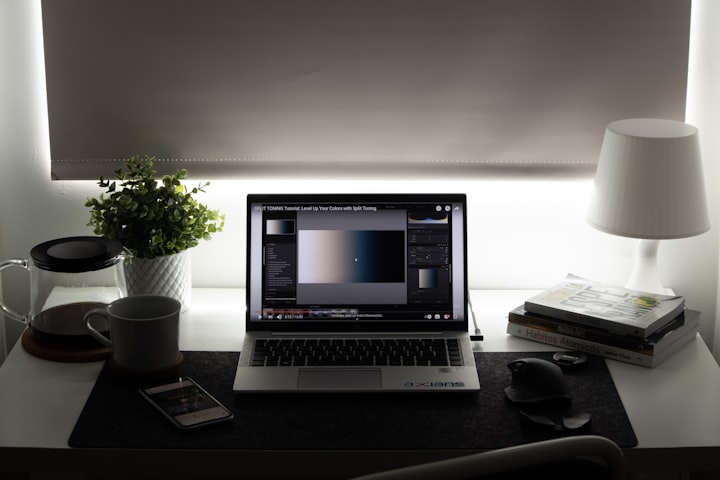The Extraordinary Power of Quiet Contemplation in Your Workspace
Become more productive by taking time out to breathe and reflect

Every morning when I awake I tend to do these three things. Believe it or not none of them involve a mobile phone! The first thing is a 10-minute mindful body scan to check in with myself and see how I am doing. I then think of at least 3 things I am grateful for — one of these 3 things is always food or coffee-related! Finally, I sit quietly, take a deep breath and just enjoy the peace that is in that moment.
So, what does this morning routine have to do with the extraordinary power of quiet contemplation in your workspace?
I was recently chatting to a work colleague and explaining how waking up at least 10 minutes early, sitting quietly, and practicing some deeper breaths before breakfast had helped during the pandemic. It has also got me through some difficult decisions and tough times.
I referred to this as ‘micro-mindful breaks’. Although in reality, it’s more of a combination of mindful breathing and reflection. We live in a busy society, but being busy does not always equate to productivity. Rushing around constantly from task to task without any reflective time is a sure way to get in a muddle and burn out quickly.
An example of this can be taken from the lockdown period. The switch to digital meant fewer travel times, an increase in meetings, and some office staff spending longer periods in front of a screen. The term ‘Zoom fatigued’ was coined. Workers across the world started to feel as if they had burned out. This had also highlighted the importance of ‘travel times’ as some of us used these periods for reflection.
Sitting quietly really helped fuel my morning routine and this, in turn, inspired my working routine too. Instead of logging into meeting after meeting, I took a 3–5 minute micro-mindful break for some quiet contemplation.
Taking some deeper breaths and reflecting non-judgementally on the previous discussions before moving on to the next. Doing this helped me to digest the information and as a result, make better decisions. So, I guess the question is — how can you put this into practice in your workspace?
***
Putting quiet contemplation into practice
Last year, I was asked to speak at an online wellbeing conference about mental health for a well-known bank. There was a range of amazing speakers there including MBE holders. In the run-up to the event, my anxiety started to gnaw away at me. About 20 minutes before the event was due to start I decided to pop into the garden, take some deep breaths and just sit quietly.
It was a chance to recollect my thoughts, gain some focus, and mentally prepare myself. I was able to switch off those negative thinking habits and fully embrace the present moment. As a result my anxieties slowly lessened and I felt ready to speak.
So, the key takeaway here is before important meetings, public speaking, or switching between tasks take some time to get into the present moment. We know that being more mindful is highly beneficial for mental wellbeing. Purposely focusing your attention on the present moment will allow you to discover how you are currently feeling without any judgments and focus purely on your current airspace. This will allow you to fully experience the present moment.
To apply this during work you may have to book a specific time slot for quiet contemplation into your diaries. Ensuring that if you want to be more productive during the day we prioritise micro-mindful breaks. It could be worth noting that having some quiet time should not always be before an event. It’s also important to book time in-between and after meetings for reflection, digestion of information, and taking those deeper breathes for clarity.
***
Micro-Mindful Breaks
- If you can move away from your desk area if possible.
- Set a timer for 3–5 minutes.
- Take 3-4 deep breaths or simply sigh.
- Sit quietly and reflect upon how you are in the current moment.
- Then some time to digest and reflect on the last task or meeting and how you currently feel about it.
- Take another 3–4 deep breaks and return to your next task or meeting
- The benefits of quiet contemplation at work
The proven benefits of micro-mindful breaks include improved self-control, tolerance, enhanced flexibility, creativity, higher concentration and focus of attention, increased emotional intelligence, greater acceptance, and self-compassion.
***
In Summary
What is so extraordinary about the power of quiet contemplation in your workspace? The power of creating some breathing space during the day is not only beneficial to yourself and the organization in terms of increased productivity, but it’s also a form of self-care.
👉 Check out my other stories here, if you like what you read please subscribe 🖤
***
Further Reading and References:
Zoom Fatigue | More Meetings, Less Productivity | AllWork.Space (https://allwork.space/2021/05/zoom-fatigue/)
A Neuropsychological Exploration of Zoom Fatigue (https://www.psychiatrictimes.com/view/psychological-exploration-zoom-fatigue)
Authentic Leadership: What It Is & Why It's Important (https://online.hbs.edu/blog/post/authentic-leadership)
Protecting Employee Wellbeing | (https://www.hrzone.com/community/blogs/tom-norfolk/protecting-employee-wellbeing)
Mindfulness at Work: Using Mindful Leadership in the Workplace (positivepsychology.com)
About the Creator
Trisha Dunbar
Rambling of written words | Reader of things | Drinker of coffee | Doer of stuff | Welcome to my profile 😊






Comments
There are no comments for this story
Be the first to respond and start the conversation.